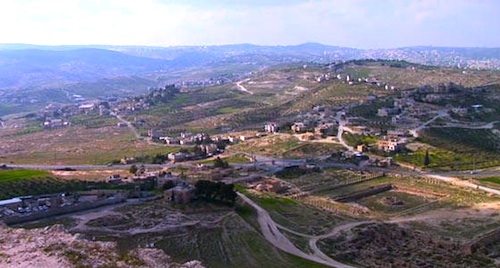By Joe Bendel. Everyone wants to sell them out and nobody wants you to see them up close and personal: they are the Israeli settlers living in both official and unofficial settlements within the West Bank. A great number of them also happen to be Ukrainian and Russian immigrants. Filmmaker Dmitriy Khavin continues to document the Ukrainian Diaspora, giving viewers a rare unfiltered look at the Israeli settlement experience in The Territory, which premieres this coming Tuesday at the JCC in Manhattan as part of the Generation R film program.
The settlements are not what you might expect. Where once there were dormitories and trailers there are now pleasant looking middle class homes. Granted, they are often found in gated communities, not uncommonly with armed guards out front. The land around them looks rather harsh and arid—hardly terrain worth fighting for. However, the fortifications are clearly there for a reason.
These first and second generation Soviet immigrants are products of the Refusenik movement. Their families’ experiences under Communism directly shaped their Zionist convictions. Still, they might not exactly be what viewers expect, either. Some are simply taking advantage of the inexpensive housing. Yes, Khavin also talks to some who express less than edifying opinions on their hostile Arab neighbors. Yet, many are clearly inclined to live in peace and harmony with all residents of the territory. Nonetheless, they consciously chose the risks involved in forming a buffer to protect the rest of Israel.

Throughout The Territory, Khavin challenges preconceptions across the political spectrum, beginning with film’s calm, peaceful tone. There are no bombs exploding here. His interview subjects go about their daily business like people anywhere, adopting a God-is-my-copilot attitude. Occasionally there are ugly reminders of the terrorism for which the territory is infamous for. One of Khavin’s guides takes viewers to the shrine dedicated to a tiny infant murdered by a sniper. Residents assume the young innocent was deliberately targeted by the Palestinian murderer and it is hard to argue with them, given the results.
The West Bank settlements will always be a thorny issue to untangle. However, the media would like people to blindly assume they are all lunatic Kahane clones, which simply is not the case. Indeed, many are part of the epic Russian and Ukrainian stories starting tragically in the early Twentieth Century. A real example of documentary filmmaking journalism, the forty-one minute The Territory ought to be broadcast on PBS, perhaps as part of a series with Khavin’s other films (like Artists of Odessa), but do not hold your breath. A balanced and intriguing look at one of the world’s most misunderstood tracts of land, The Territory is recommended for all inquisitive viewers when it screens Tuesday (1/15) at the JCC in Manhattan.
Posted on January 11th, 2012 at 10:24am.